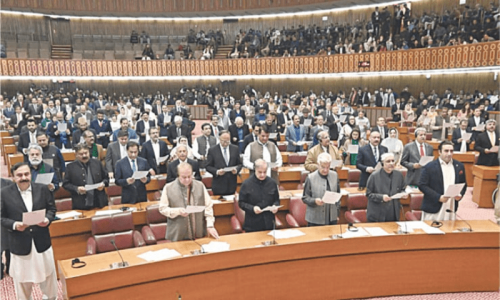An apt description of Pakistan’s IT industry is that it’s “always the bridesmaid but never the bride”. There were several occasions over the last four decades where it was on the verge of a takeoff that either stalled or got subsumed by a larger sea of change, whether it was government apathy, the dotcom boom and bust of the late nineties or the telecom revolution of the last decade.
Before we quantify our current state and explore our options for the next decade, we need to understand where it all started and how major opportunities were missed along the way, wasting its true potential.
Decade long cycles
The formative years for our IT industry were the early seventies, where just three multinationals, IBM, NCR and ICL, with no more than 200 people between them, supplied mainframe and mid-range computers to the Government and a few large corporations. This was a time where a computer would take anywhere from between 8-18 months to arrive after the order was placed and the software and training was bundled free of charge for whoever could afford the expensive hardware.
There was even an Orwellian sounding ’Mechanisation Committee’ that approved all imports of computers and encouraged organisations to share the downtime of their mainframes instead of buying their own machines.
This all changed with Systems Limited, which was Pakistan’s first IT company. After its founding in 1977, several other service providers and system integrators followed suit and imports slowly opened up. The 80’s saw the global PC boom and the seeds of ‘computerisation’ were born. Microsoft Windows moved computers from offices to our homes and we played games, learnt computer skills and realised that the discipline of Computer Science can do wonders. This was the decade where software became more important than hardware, although we were still its consumers and not developing anything significant, except the infamous Brain, the world’s first computer virus.
Everyone realised how important computers were, but as soon as the internet landed in Pakistan in the early nineties, its significance in connecting us to the world became very obvious. This could have been a revolutionary decade for Pakistan - just like it was for India - but we lacked the visionary policies and educational infrastructure to scale effectively.
Adequate international connectivity was ignored and the internet was treated as a luxury by the government. In the private sector, companies such as CresSoft stood out and could have become the backbone of our IT industry, but they fizzled away due to mismanagement and an apathetic government. The other golden opportunity missed by our government in the nineties was of online payments and an e-commerce infrastructure that could have expanded our economy to a whole new level. The repercussions of ignoring high speed internet and ecommerce at that time pushed us more than 10 years behind the rest of the world.
Whereas the government knew how to give subsidies to textile exporters and tax breaks to agriculture and other key sectors, they had no idea how to support and nurture the still nascent IT industry, except by making regular speeches about how we could replicate India’s export model and “catch up”. Time and again, lukewarm initiatives were tried, but the IT sector didn’t see any meaningful growth. If sincere efforts had been done, it could have provided the ideal foundation for the telecom sector to boom later.
An opportunistic surge due to the Y2K remediation projects brought in a lot of business, but once the hype was over, that inflow could not be converted into long term relationships. Back office operations and call centres had also started mushrooming in the early 2000’s, and despite the repercussions of 9/11, that sector grew at a very promising rate until our core infrastructure and scalability issues put a cap on its growth.
This was definitely one of the golden decades in terms of IT, where internet access mushroomed from just a few cities to several hundred. Broadband rates also plummeted and with the telecom boom, IT became an integral thread of our economy. As a result, call centres and BPO companies became an important sub sector of the industry.
In the absence of a ‘big four’ model like India, our industry growth has been fuelled by hundreds of small companies which have cropped up during the smartphone revolution.
There are a handful of companies with more than a thousand people and a few dozen with more than a hundred people. The vast majority of companies employ between 10-100 people and 99 per cent of them are services providers for hire. As the freelancing ecosystem grows and matures, it provides a major chunk of revenue coming into Pakistan. The next decade’s growth cycles will probably be driven by mobile development companies and freelancers.
 |
| Phone and Internet usage |
Industry sizing
People who have seen the industry’s growth find official figures close to fantasy. The State Bank of Pakistan’s numbers also underestimate the industry’s size, as a large chunk of revenue stays outside of Pakistan due to subsidiaries and foreign accounts. The educated guesstimates lie somewhere in between the SBP numbers and the extremely loose estimates of the GoP. Assuming our top 5-10 largest companies are each making revenues between 10 million to 50 million dollars per annum, the billions that are quoted seem a bit far-fetched. In the absence of reliable data, some educated estimates place the industry revenue between 1 to 1.4 billion dollars, with two thirds of the revenue coming from exports.
Here are some key industry figures:
 |
| Key Figures |
The Boom is beginning
With the passion of innovation in our youngsters, the coming decade is going to be extremely transformative. Once again riding the telecom industry’s next leap, software and IT is about to take our economy to the next level.
As we stand at the cusp of next generation deployments by telcos and a maturing e-commerce eco system, the main engines of growth will be centred on mobile payments, e-commerce infrastructure, IT enabled supply chains, education and entertainment content for 3G/4G and beyond. These key areas will add a protective layer to our economy and the growth will be irreversible to a great extent.
Small businesses will boom under this new eco-system as they will gain access to markets they never thought possible. Cottage industries will be able to sell to the same consumers that are targeted by leading brands, both locally and globally. The strength of this period is based on the ripe potential in the local economy, which can now grow regardless of a lot of external factors. These local changes are overdue and the demand vacuum will force domestic and international players to step in and expand the market permanently.
Unbelievable transformations have already been experienced by multiple societies around the world and the proven methodologies are begging us to follow the example of those success stories. How quickly and creatively our companies and government pursue these strategies will determine if we will creep forward organically or leap frog to make up for the lost decades.
Shehryar Hydri is the Director Marketing & Operations at Convo.com. He is also an Advisor to Eyedeus.com / Groopic.com. he Tweets@sheryhydri














































